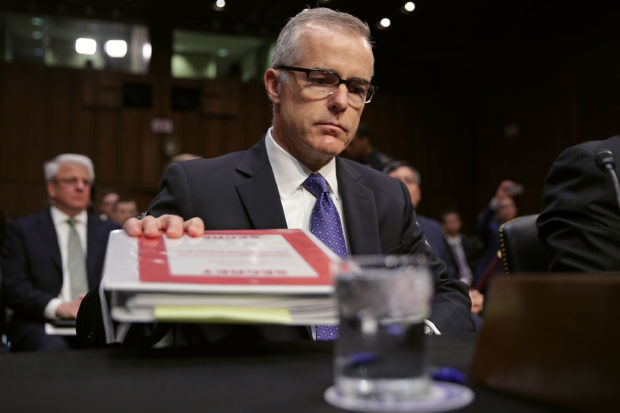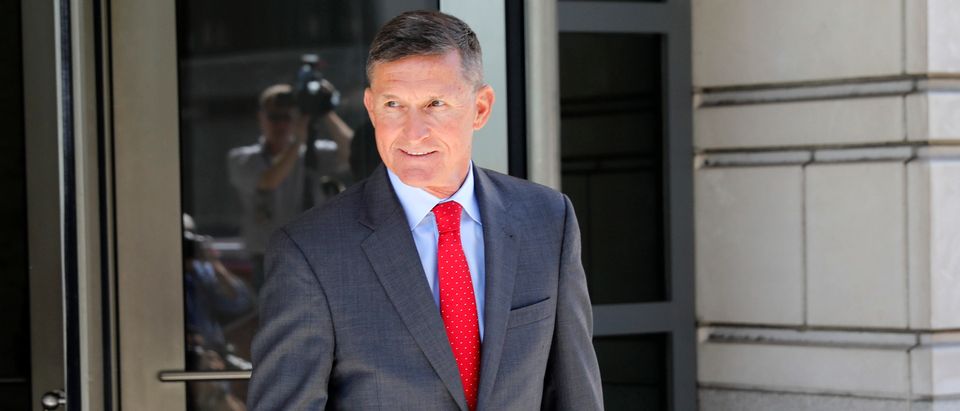- The identity of Michael Flynn was never “masked” in an intelligence report that was later leaked to the media about the retired lieutenant general’s phone calls with a Russian diplomat.
- The FBI wiretapped the phone call in question, The Washington Post confirmed in a report on Wednesday.
- The report puts the FBI in a more pivotal role in handling the intelligence that preceded a leak to the Post for a column published on Jan. 12, 2017.
The FBI wiretapped phone calls between a Russian ambassador and former National Security Adviser Michael Flynn that were the subject of a classified leak to The Washington Post in early 2017, the newspaper reported on Wednesday.
Flynn’s identity was not masked in a transcript that the FBI created after Flynn’s phone calls with the ambassador, Sergey Kislyak, the Post also reported, citing former U.S. officials.
The revelation, which confirms analysis from the Daily Caller News Foundation this week, helps explain why the Flynn-Kislyak call was not the subject of an unmasking request listed in a document that Senate Republicans released on May 13.
The document listed 39 Obama administration officials who submitted requests for intelligence reports that identified Flynn in National Security Agency (NSA) intelligence reports drafted between Nov. 8, 2016, and Jan. 31, 2017.
The list initially caused confusion because there was not a request for information on Flynn that coincided with the date of his phone calls with Kislyak, Dec. 29, 2016. (RELATED: How The FBI Used News Hooks To Advance The Trump-Russia Probe)
Republicans have for more than three years speculated that a leak to Post columnist David Ignatius about Flynn’s calls with the Russian diplomat was the result of an unmasking request made by Obama administration officials.

Acting FBI Director Andrew McCabe and the other heads of the U.S. intelligence agencies prepare to testify before the Senate Intelligence Committee in the Hart Senate Office Building on Capitol Hill May 11, 2017 in Washington, DC. (Photo by Alex Wong/Getty Images)
In a Jan. 12, 2017, column, Ignatius reported that a “senior U.S. government official” revealed that Flynn and Kislyak spoke by phone, possibly about U.S. sanctions against Russia.
The Ignatius column touched off a series of events that led to an FBI interview with Flynn at the White House on Jan. 24, 2017. Flynn pleaded guilty to making false statements to the FBI agents regarding details of his phone call with Kislyak.
GOP lawmakers have called for investigations into the leak of the information, which is classified.
Flynn has since retracted his claim to have lied to the FBI. The Justice Department filed a motion on May 7 to toss out Flynn’s case. Attorney General William Barr has accused the FBI of laying a “perjury trap” for the retired lieutenant general.
The Post’s latest report puts the FBI at a more pivotal role in handling the intelligence related to Flynn.
“When the FBI circulated [the report], they included Flynn’s name from the beginning,” a former senior U.S. official told the Post. “There were therefore no requests for the unmasking of that information.”
“When the FBI circulated [the report], they included Flynn’s name from the beginning,” another former senior U.S. official told the newspaper. “There were therefore no requests for the unmasking of that information.”
The individual who leaked to the Post has not been identified. The agency the person worked for has also not been named. Republican lawmakers have called for an investigation into the leak.
The FBI shared the intelligence on Flynn’s call widely through the Obama administration.
Andrew McCabe, the former deputy director of the FBI, suggested in congressional testimony and his book, “The Threat,” that the FBI had the initial intelligence report of the Flynn-Kislyak call.
He wrote in his book that the report of the call was passed to then-FBI Director James Comey, who shared it with James Clapper, the director of national intelligence.
Comey also discussed Flynn and Kislyak in a Jan. 5, 2017, meeting at the Oval Office with former President Barack Obama, according to an email that then-National Security Adviser Susan Rice wrote to herself on Jan. 20, 2017.
Officials in the FBI, Justice Department and Office of the Director of National Intelligence also discussed the Logan Act in connection with Flynn’s call with Kislyak, according to documents released in Flynn’s case.
The Logan Act prohibits private citizens from negotiating with foreign governments on U.S. policy matters. Though the Logan Act has only been charged twice in its 221-year existence, Ignatius mentioned the law in context with Flynn’s call in his Jan. 12, 2017 column.
FBI emails provided to Flynn’s defense team on April 30 showed that officials at the bureau were discussing the Logan Act in connection with the investigation of Flynn on Jan. 4, 2017. Peter Strzok, who then served as deputy chief of FBI counterintelligence, exchanged emails about the Logan Act with Lisa Page and James Baker, who were lawyers for the bureau.
Strzok was the lead agent in the White House interview with Flynn three weeks later.
All content created by the Daily Caller News Foundation, an independent and nonpartisan newswire service, is available without charge to any legitimate news publisher that can provide a large audience. All republished articles must include our logo, our reporter’s byline and their DCNF affiliation. For any questions about our guidelines or partnering with us, please contact licensing@dailycallernewsfoundation.org.












